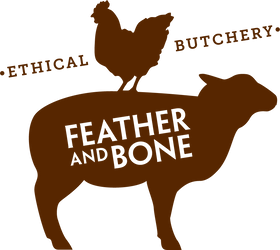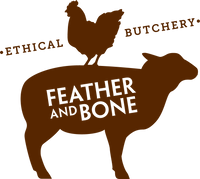Everything is connected
Hooray, it's finally raining! As the lovely Fiona Smith from Working With Nature Farm says, this morning it was windy enough to blow a dog off its chain and Vince at Moorlands Biodynamic Farm got 26 mm on Monday night which he says he hopes might be a 'game changer'. But it's still as dry as a chip in many of the NSW regions where our food is grown - climate change is very real there and it's very real here, too.
'Looking forward to what the future brings...'
Kim Kiss's words are humbling and moving and fill me with hope as I listen to the rare sound of spring rain falling on our parched garden and filling our Marrickville water tanks and bird baths this morning.
This week at Meramie Farm where Brian and Kim Kiss raise the Grassland Poultry Sommerlad chickens we receive every fortnight, they finally trucked out the last of the cattle in order to preserve precious soil and pasture health in the face of the extended drought. Meramie is usually home to around 500 cows, a flock of Sommerlad chickens and some sheep and is regeneratively managed as an ecosystem in which everything needs to thrive, from the smallest soil microbes, plants and insects through to chickens, cows and humans. But since 2017, in response to the seasons and in an effort to preserve ecosystem health, the Kisses have been gradually de-stocking to point where, as of yesterday, all that's left are a few breeding bulls and the hardy and wonderful Sommerlad chooks. As Kim wrote,
'Now we wait for this big, dry spell to be over and the pastures to regenerate... Looking forward to seeing what the future brings.'
We're in awe of the spine and heart it takes to remain so unwaveringly focussed on the long term and to face hardship with such grace and optimism.
Rain has shunned so much of our wide brown land over the last four or five years and even coastal Sydney-siders, accustomed to the comparatively lush edges girt by sea, are bemoaning the crisp, yellowed swards of our golf courses and gardens. (By the way, as Deborah Cheetham says, if you never want to have to sing 'girt' again, try Judith Durham's version of Advance Australia Fair.)
Any rain is welcome, particularly this timely spring rain that feeds new growth. But over the last few years, it often seems that when the rain does finally come it doesn't arrive in spring and autumn when it's most needed, but instead it turns up in mid-winter or mid-summer, hurtling down in torrential volumes that cause almost as much damage as the cracking dry. Rain just isn't what it used to be.
Drive inland from the NSW coast and the further you go the more things become genuinely perilous. Faced with predictions that the drought won't break until at least February 2020, many farmers who've already used every trick in the book to survive this long dry are seriously considering their options and some have already walked away. Even the visionary, regenerative farmers we represent, who are acutely observant and responsive, who've worked so hard to foster the resilience and health of their farm ecosystems and who de-stocked or changed course years ago, are wondering how they'll keep going. They are doggedly pragmatic, realistic and determined not to compromise land and animal health.
As Rob Lennon, who grows organic Wagyu cattle at Gundooee Farm, says, 'I may be in drought, but my animals aren't.'
Whether they're growing ruminants, dependent on complex pastures, or omnivores dependent on external inputs, everyone is feeling the strain.
At Near River, about an hour inland from Port Macquarie, Andrew and Therese Hearn supplement the diet of their pasture-raised, Berkshire pigs with whey from the local cheese factory. But because the river level is so low, the local dairy farms are now prohibited from irrigating with river water which may cause a reduction in milk supply to the cheese factory and potentially jeopardise the supply of whey to the Near River pigs. Which may mean less pasture-raised pork for all of us.
As the Hearns said in their newsletter on Monday, '...in these times you really get that everything is connected.'
Which really is the point here. Everything is connected and every action we take and choice we make creates consequences that need to be accounted for either by us, directly, or by others down the line or in the future. Just because you can't see it doesn't mean it's not happening. Whether you're a farmer responsible for farm ecosystem health or an urban customer doing the weekly food shop, the challenge to wise up and take full responsibility for our actions offers either a wildly inspiring and urgent opportunity for change or a terrifying stumbling block, depending on your attitude and what's at stake.
Blind to our prevarications, however, the drought stretches on and the only good we can see coming from it is the long-awaited, glimmering recognition of the connection between agricultural management and climate change. Fancy that! As we've said repeatedly here over the last eight years, we collectively owe a debt to the regenerative farmers who worked this out long ago and chose to branch away from conventional, extractive land practices and instead now work in lock step with natural systems, painstakingly building long term, sustainable fertility.
Because, while farmers own their land and are free to manage it as they choose, there is a broader, accepted notion that these lands, collectively, make up ‘our’ Australia. This is ‘our’ soil and ‘our’ food future partitioned up into lands owned and managed by custodian farmers and, as it turns out, the way it’s being managed has a direct impact on all of us. We all pay the price and we all stand to benefit.
So, if we accept that we’re inextricably connected and that our choices have a direct impact on the way our country is managed, we start to understand that we’re not bystanders in the production of our food. Even more, we also start to see that the specific loaf of bread or packet of sausages we’re putting into our shopping cart isn’t just a commodity but is actually representative of a whole series of decisions and consequences which are directly connected to us, our community and our country.
If you want to support regenerative farmers during this drought and promote a fertile and sustainable Australian food system, what choices will you make?
NB: This is a good piece from The Conversation about the 'just and careful' response that's required to combat climate change without a backlash.
Right, that's enough ranting, time to tuck in.




Leave a comment